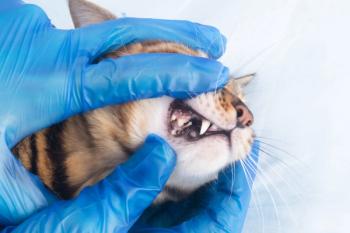
An update on heartworm disease and HARD in cats
Dr. Ray Dillon shares why this juvenile delinquent form of heartworm disease causes so much trouble in feline veterinary patients.
What do veterinarians need to know about feline heartworm disease and heartworm-associated respiratory disease (HARD) in cats? Ray Dillon, DVM, MS, MBA, DACVIM, professor of small animal internal medicine at Auburn University, took a few minutes to answer these questions at the 15th Triennial Heartworm Symposium in New Orleans.
Feline heartworm disease: Think quality of life, not life or death
“When we first started thinking of this disease 40 years ago, we made the mistake of always assuming it is a fatal disease,” says Dr. Dillon. “And now we recognize that it is rarely a fatal disease.”
Feline heartworm disease does, however, affect the cat's quality of life-often for the duration of the cat's life, Dr. Dillon says.
Even an “unsuccessful” infection-one where the parasite doesn't make it to the adult stage-can have dire consequences on the cat's respiratory tract, Dr. Dillon says. The cat is still likely to suffer from disease even though it's not the adult parasite causing it.
So what's the takeaway? According to Dr. Dillon, both veterinary professionals and clients need to be reminded that this is a quality-of-life disease instead of a life-or-death disease.
Get the scoop in Dr. Dillon's own words below:
HARD: Hard diagnostics
“The incidence of HARD (and even the incidence of heartworms) in cats is an ongoing question people always want to know,” says Dr. Dillon. But instead of wading through percentages with clients, Dr. Dillon simply reminds them that if it occurs in their cat, it affects 100 percent of the cat.
“We know that the infection rate throughout most of the Southeast in cats is about a third of all cats come up heartworm-antibody-positive at some point in their lives, which means they were successfully infected,” says Dr. Dillon. But the real question is how far the worms traveled and developed in the cat before dying.
“Did they die precardiac?” he says. “Did they make it to the HARD stage and die? Did they make it to the adult heartworm [stage] and then the adult heartworm died?”
Dr. Dillon explains that HARD is seasonal instead of lifelong, which can complicate diagnostics.
“HARD represents a juvenile delinquent form of the adult heartworm, so it's very much like a car wreck caused by a juvenile delinquent driver: They come in, they have a wreck, they cause all kinds of damage and then they're gone,” he says. “There's no way to go back and prove who caused that accident.”
Because HARD is so transient, clinicians can't easily perform diagnostics that confirm the disease 100 percent. “Necropsy studies only study cats that develop fully mature adult heartworms, and that's simply the tip of the iceberg,” Dr. Dillon says.
Hear more from Dr. Dillon on HARD below:
Newsletter
From exam room tips to practice management insights, get trusted veterinary news delivered straight to your inbox—subscribe to dvm360.






